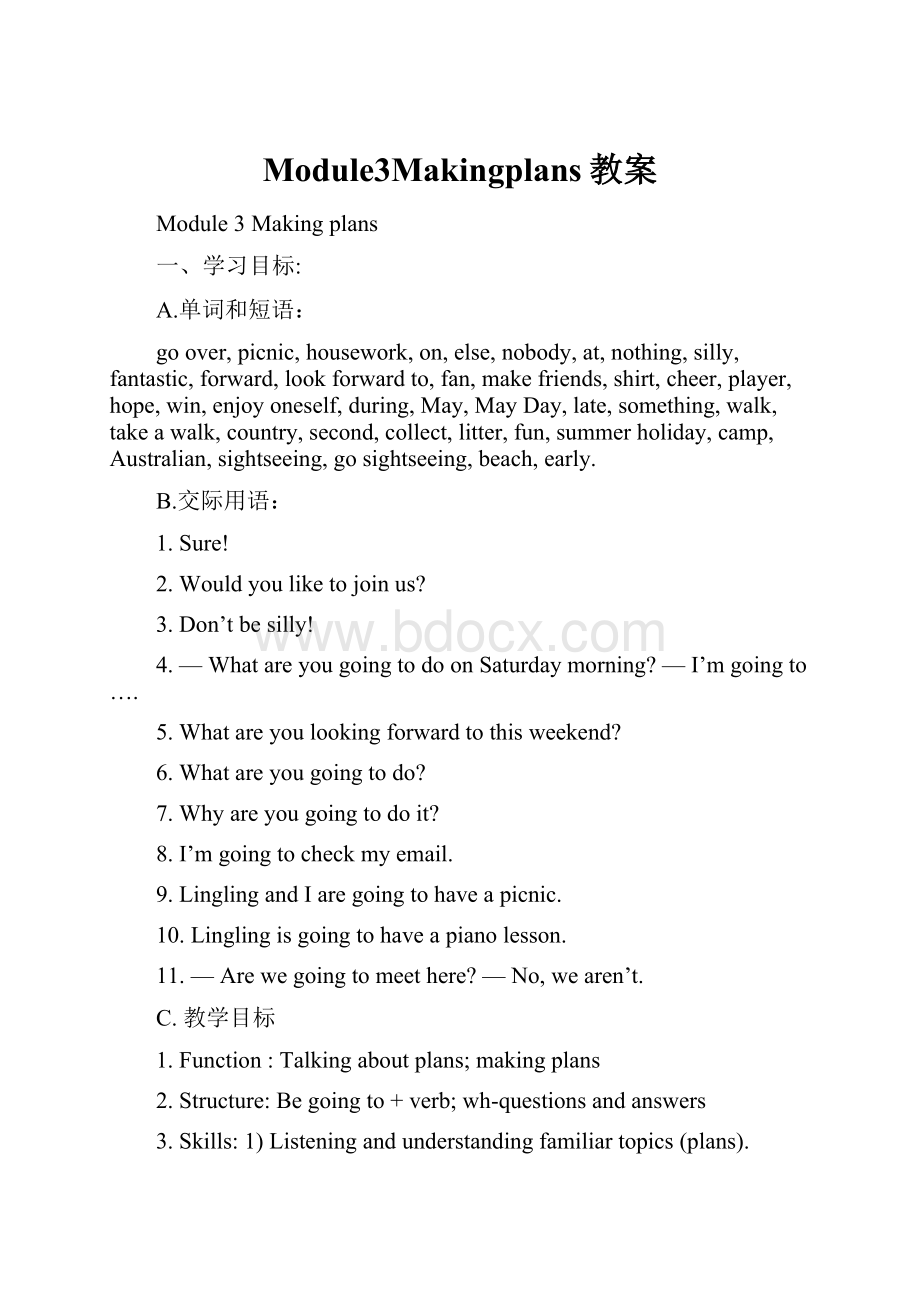Module3Makingplans教案.docx
《Module3Makingplans教案.docx》由会员分享,可在线阅读,更多相关《Module3Makingplans教案.docx(23页珍藏版)》请在冰豆网上搜索。

Module3Makingplans教案
Module3Makingplans
一、学习目标:
A.单词和短语:
goover,picnic,housework,on,else,nobody,at,nothing,silly,fantastic,forward,lookforwardto,fan,makefriends,shirt,cheer,player,hope,win,enjoyoneself,during,May,MayDay,late,something,walk,takeawalk,country,second,collect,litter,fun,summerholiday,camp,Australian,sightseeing,gosightseeing,beach,early.
B.交际用语:
1.Sure!
2.Wouldyouliketojoinus?
3.Don’tbesilly!
4.—WhatareyougoingtodoonSaturdaymorning?
—I’mgoingto….
5.Whatareyoulookingforwardtothisweekend?
6.Whatareyougoingtodo?
7.Whyareyougoingtodoit?
8.I’mgoingtocheckmyemail.
9.LinglingandIaregoingtohaveapicnic.
10.Linglingisgoingtohaveapianolesson.
11.—Arewegoingtomeethere?
—No,wearen’t.
C.教学目标
1.Function:
Talkingaboutplans;makingplans
2.Structure:
Begoingto+verb;wh-questionsandanswers
3.Skills:
1)Listeningandunderstandingfamiliartopics(plans).
2)Talkingaboutfamiliartopics(plans).
3)Readingandunderstandingsimplepassages.
4)Composingasimplepassage.
4.Aroundtheworld:
Weekendplans.
5.Task:
Talkingaboutyourweekendplans.
二、重点及难点:
begoingto+verb;wh-questionsandanswers
三、教学设计:
Unit1Whatareyougoingtodoattheweekend?
ⅠTeachingmodel
Listeningandspeaking
ⅡTeachingmethod
Bottom-upapproachtolistening
ⅢTeachingaims
1.Tounderstandconversations.
2.Askandanswer:
Whatareyougoingtodoattheweekend?
ⅣTeachingObjectives
1.Keyvocabulary:
goover,picnic,housework,on,else,nobody,at,nothing,silly,fantastic
2.Keystructures:
—WhatareyougoingtodoonSaturdaymorning?
—I’mgoingto….
ⅤTeachingaids
Taperecorder,OHP,video
ⅥTeachingSteps
Step1Warming-up
1.Showsomepicturesofschoolthings.Saywhattheyare.
2.Readthewordsaftertheteacher.
3.Introducethenewwords.
Step2Matching.
1.AskthestudentstoreadthewordandexpressionsinActivity1.
A
checkgooverhaveseehelphave
B
amovieapianolessonapicniclessonsmyemailwiththehousework
2.Playtherecordingandaskthestudentstolistentotherecordingcarefully.
3.MatchthewordsandexpressionfromBoxAwiththewordandexpressionsfromBoxB.
4.Playtherecordingagain,thentheycanchecktheiranswerwithapartner.
5.Callbacktheanswerfromthewholeclassandchecktheanswer.
Keys:
1.checkmyemail2.gooverlessons3.haveapianolesson
4.seeamovie5.helpwiththehousework6.haveapicnic
6.MatchtheexpressionsinActivity1withthepicturesinActivity2.
7.Readtheexpressionstogether.
Step3Listenandread.
1.Askthestudentstoreadtheconversationsilently.
2.Playtherecordingandaskthestudentstolistenandreadtheconversation.
3.Readtheconversation.
4.Actitout.
5.Learn“EverydayEnglish”
Welcomeback!
Pleasebecarefulwith…
fromnowon.
Step4Answerthequestions.
1.Readtheconversationagain.
2.Answerthequestions.
1)What’sDaminggoingtodoonSaturdaymorning?
2)What’sBettygoingtodoonSaturdayafternoon?
3)WhoisgoingtohaveapianolessononSaturday?
4)Wherearetheygoingtohaveapicnic?
3.Askthestudentstocheckwithapartner.
4.Playtherecordingagain.Checktheanswers:
Keys:
1.Heisgoingtocheckhisemail,dohishomeworkandhelpwiththehouseworkonSaturdaymorning.
2.SheisgoingtoseeamovieonSaturdayafternoon.
3.LinglingisgoingtohaveapianolessononSaturday.
4.Theyaregoingtomeetinthepark.
Step5Completetheconversation.
1.AskthestudentstoreadthewordsintheboxinActivity4.
aloneelsefantasticnothingsilly
2.Readthroughtheconversation.
Betty:
Whatareyourplansfornextweekend,Lingling?
Lingling:
(1)____________.Idon’thaveanyplans.
Betty:
Areyougoingtospendit
(2)____________athome?
Lingling:
Well,…whatareyougoingtodo?
Betty:
TonyandIaregoingtohaveapicnicinthepark.We’regoingtohavea(3)____________time.Areyougoingtocome?
Lingling:
I’mnotsure.
Betty:
Don’tbe(4)____________!
What(5)____________areyougoingtodo?
3.Completetheconversationwiththecorrectformofthewordsfromthebox.
4.Askthestudentstocheckwithapartner.
5.Checktheanswers:
Keys:
1.Nothing2.alone3.fantastic4.silly5.else
6.Readtheconversationloudly.
Step6Listenandrepeat.
1.Playtherecordingoncewithoutstopping.
2.Playtherecordingagainandstopattheendofeachline.Askthewholeclasstorepeat.
3.Playtherecordingagainandstopattheendofeachline.Askindividualstudentstorepeat.
4.Askthestudentstopracticethesoundsinpairs.
Step7Workinpairs.
Askandanswerquestionsaboutyourplantsattheweekend.
1.Askandanswerlikethis:
—WhatareyougoingtodoonSaturdaymorning?
—I’mgoingtocheckmyemailanddomyhomework.
2.Readthroughtheexamplewiththeclass.
3.Pairthemtoaskandanswer.
4.Circulateandmonitortheirproduction.
5.Completethediary.
You
Yourpartner
Saturday
morning
checkemaildohomework
afternoon
evening
Sunday
morning
afternoon
evening
Step8Guessinggame.
1.Showsomepicturesofschoolthings.
2.Accordingtotheinformationgivenandaskthestudentstoguesswhatitis.
3.Showthepicturestochecktheanswers.
Step9Languagepoints
1.OnSaturdaymorning,I’mgoingtocheckmyemailanddomyhomework.
I’mgoingtoseeamovieintheafternoon.
如果我们要表达“在上午、下午、晚上”,可以说inthemorning/evening/afternoon。
例如:
Don'twatchTVtoomuchintheevening.晚上不要看太多电视。
Theysometimesplaygamesintheafternoon.他们有时在下午做游戏。
但如果特指“在具体的某一天”或“(在具体的某一天的)上午、下午、晚上”等,须用介词on。
例如:
I’llseeyouonMondaymorning.
周一上午见。
ShealwaysgoestoseeafilmonFridayevening.
她总是周五晚上去看电影。
中考链接:
1.—Whendidyourunclearrive____China?
—HegottoGuangzhou_______themorningofthe16thofApril.
A.at;inB.in;inC.to;onD.in;on
2.—Whendidthefiretakeplace?
—Ittookplace_______Sundaymorning.
A.onB.atC.inD.of
2.Whoelseisgoingtobethere?
elseadv.其他;此外;
例句:
Whatelsedidhesay?
他还说了些什么?
Whoelseiscoming?
还有谁要来?
other&else
other与else都有“其他”的意思。
◆other用作形容词,意为“其他的”,一般放在被修饰词的前面。
如:
Doyouhaveanyotherquestions?
I’llcomewithtwootherstudents.
◆else用作副词,意为“其他;另外”,通常放在不定代词或疑问词的后面。
如:
Asksomebodyelsetohelpyou.
Whoelseisthereinthehouse?
用else或other填空。
1.Where________wouldyouliketogo?
2.What________animalsareyougoingtoseetomorrow?
3.Doyouseeanybody_____intheclassroom?
4.What______doyouwanttodo?
3.LinglingandIaregoingtohaveapicnic.
haveapicnic“去野餐”。
在英语中,经常用have+n.组成词组,例如:
havealookat看一看
havebreakfast/lunch/supper吃早/午/晚饭
haveclasses/lessons上课
haveameeting开会
havearest休息一会儿
4.Nothing.
nothing常用作代词,意为“没有什么;没有东西”,在句中可以作主语,也可以作宾语。
如:
Nothingisonthetable.
NothingcanmakeTomfeelhappy.
Iknownothingaboutcooking.
◆nothing作宾语时,相当于not...anything。
所以第三个例句可变为:
Idon’tknowanythingaboutcooking.
将下面的汉语句子翻译为英语。
盒子里什么也没有。
____________________________
5.I’mgoingtostayathomealone.
stayathome意为“呆在家里”。
如:
MarylikestostayathomeonSunday.
将下面的汉语句子翻译为英语。
明天你打算呆在家里吗?
_______________________________
Step10Doexercises:
一、翻译下列短语:
1.查电子邮件______________2.复习功课________________
3.上钢琴课________________4.看电影_________________
5.帮助做家务_______________6.野炊____________________
Keys:
1.checkemail2.gooverlessons3.haveapianolesson
4.seeamovie5.helpwiththehousework6.haveapicnic
二、完成句子:
1.我打算在早上查看一下电子邮件。
I_____________myemailinthemorning.
2.他打算在周末去野餐。
He________________________attheweekend.
3.我们不打算星期六去看电影。
We_____________onSaturday.
4.—你打算在下午做作业吗?
—是的。
—____you__________doyourhomeworkthisafternoon?
—Yes,I_______.
5)他打算在周末做什么?
_______he____________attheweekend?
6)他们打算什么时候复习功课?
_________they________________________?
Keys:
1.amgoingtocheck2.isgoingtohaveapicnic3.aren’tgoingtoseeamovie4.Are,goingto5.What’s,goingtodo6.Whenare,goingtogooverlessons
Step11Homework
Makeyourweekendplan.
Unit2We’regoingtocheertheplayers.
ⅠTeachingmodel
Readingandwriting.
ⅡTeachingmethod
Top-downapproach
ⅢTeachingaims
1.Listeningandunderstandingfamiliartopics(plans).
2.Talkingaboutfamiliartopics(plans).
3.Readingandunderstandingsimplepassages.
4.Composingasimplepassage.
ⅣTeachingObjectives
Keyvocabulary:
forward,lookforwardto,fan,makefriends,shirt,cheer,player,hope,win,enjoyoneself,during,May,MayDay,late,something,walk,takeawalk,country,second,collect,litter,fun,summerholiday,camp,Australian,sightseeing,gosightseeing,beach,early.
ⅤTeachingaids
Recorder,OHP,video
ⅥTeachingSteps
Step1Revision
1.Guessinggame.
1)Showsomepictures.
2)Accordingtotheinformationgivenandaskthestudentstoguess:
Whatareyougoingtodo?
3)Showthepicturestochecktheanswers.
2.ReviewthetextofUnit1.
3.Readthewordsaftertheteacher.
Step2Learnnewwords.
1.Showsomepictures.
2.Talksomethingaboutthepictures.
3.Introducethenewwords.
4.Readthewordsaftertheteacher.
Step3Reading.
1.Askthestudentstoreadthroughthepassageandmatchthepeoplewiththepictures.
2.Listentothepassageandcheck(√)whatthey’regoingtodo.
Martin
ZhangSijia
Lucy
watchafootballmatch
spendtimewithfamilyandfriends
goonasummercamp
collectlitter
staywithanAustraliafamily
meetotherfootballfan
3.Checkwithapartner.
4.Callbacktheanswersfromthewholeclass.